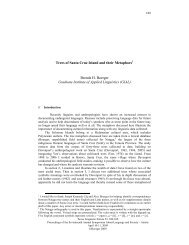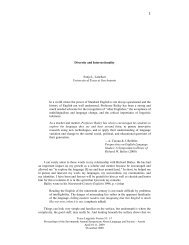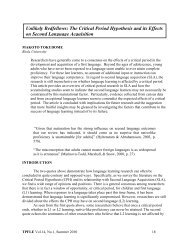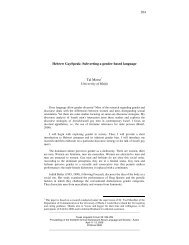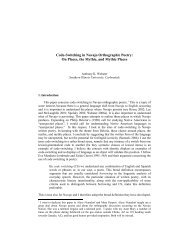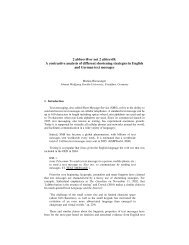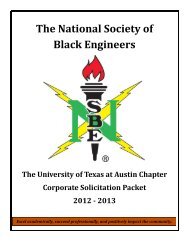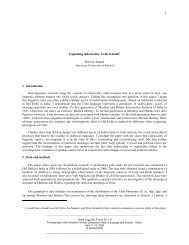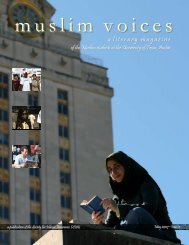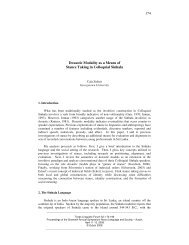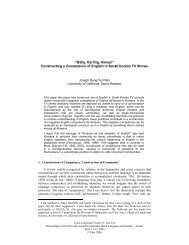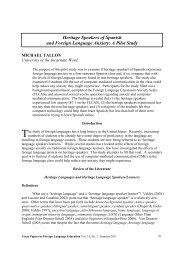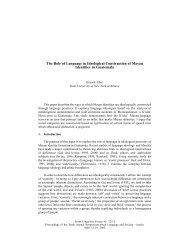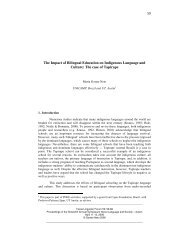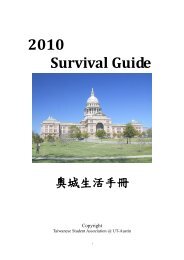Fractal Recursivity in Ideologies of Language, Identity and Modernity ...
Fractal Recursivity in Ideologies of Language, Identity and Modernity ...
Fractal Recursivity in Ideologies of Language, Identity and Modernity ...
You also want an ePaper? Increase the reach of your titles
YUMPU automatically turns print PDFs into web optimized ePapers that Google loves.
104<br />
8. Conclusions<br />
<strong>Ideologies</strong> <strong>of</strong> <strong>Language</strong>, <strong>Identity</strong> <strong>and</strong> <strong>Modernity</strong><br />
The focus on the semiotic ways that Tlaxcalans construct difference ideologically<br />
through their discourses helps to shed light on the social processes <strong>of</strong> change that have<br />
affected language shift <strong>in</strong> this region. Struggles between various ways <strong>of</strong> conceptualiz<strong>in</strong>g<br />
local identities, such as the monte/centro contrast, <strong>and</strong> concepts <strong>of</strong> “otherness” are<br />
recursively reproduced with<strong>in</strong> the county <strong>of</strong> Contla, <strong>and</strong> are belied by residues <strong>of</strong> past <strong>and</strong><br />
present discrim<strong>in</strong>ations that are part <strong>of</strong> the consciousness <strong>of</strong> these citizens <strong>of</strong> Mexico.<br />
These speakers reproduce the contrast, as they comment on it as well as negate it, show<strong>in</strong>g<br />
that these oppositions are not b<strong>in</strong>ary, but rather, complex. <strong>Recursivity</strong> provides a highly<br />
productive means for underst<strong>and</strong><strong>in</strong>g the semiotic resources speakers employ as they orient<br />
towards <strong>and</strong> aga<strong>in</strong>st particular identities through discourses they create <strong>and</strong> tap <strong>in</strong>to.<br />
Th<strong>in</strong>k<strong>in</strong>g comparatively <strong>and</strong> cross-culturally about the identities <strong>in</strong>volved <strong>in</strong> recursivities<br />
will be highly beneficial to our underst<strong>and</strong><strong>in</strong>g <strong>of</strong> how the relationships between <strong>in</strong>digenous<br />
peoples, the nation, <strong>and</strong> processes <strong>of</strong> modernization are <strong>in</strong>volved <strong>in</strong> language shift.<br />
References<br />
Bonfil Batalla, Guillermo. 1994/1987. México Pr<strong>of</strong>undo: Una Civilización Negada.<br />
México: Grijalba.<br />
Dorian, Nancy. 1977. The problem <strong>of</strong> the semi-speaker <strong>in</strong> language death. International<br />
Journal <strong>of</strong> the Sociology <strong>of</strong> <strong>Language</strong> 12:23-32.<br />
Flores Farfán, José Antonio. 1999. Cuatreros Somos y To<strong>in</strong>dioma Hablamos: Contactos<br />
y Conflictos entre el Náhuatl y el Español en el Sur de México. Mexico City: Centro<br />
de Investigaciones y Estudios Superiores en Antropología Social.<br />
Gal, Susan. 1979. <strong>Language</strong> Shift: Social Determ<strong>in</strong>ants <strong>of</strong> L<strong>in</strong>guistic Change <strong>in</strong><br />
Bil<strong>in</strong>gual Austria. New York: Academic Press.<br />
García Cancl<strong>in</strong>i, Néstor. 1993. Transform<strong>in</strong>g <strong>Modernity</strong>: Popular Culture <strong>in</strong> México.<br />
Translation <strong>of</strong> Culturas populares en el capitalismo. Aust<strong>in</strong>, TX: University <strong>of</strong> Texas<br />
Press.<br />
Garza Cuarón, Beatriz <strong>and</strong> Yol<strong>and</strong>a Lastra . 1991. “Endangered languages <strong>in</strong> Mexico,” In<br />
Endangered <strong>Language</strong>s, R. Henry Rob<strong>in</strong>s <strong>and</strong> E. M. Uhlenbeck (eds.). New York: St.<br />
Mart<strong>in</strong>'s Press.<br />
González, Norma. 2000. Tell<strong>in</strong>g tales out <strong>of</strong> school: <strong>Language</strong> ideologies <strong>in</strong> a dual<br />
language immersion program. Paper presented at the AAA annual meet<strong>in</strong>g.<br />
Hill, Jane H. 1985. The grammar <strong>of</strong> consciousness <strong>and</strong> the consciousness <strong>of</strong> grammar.<br />
American Ethnologist 12:725-37.<br />
Hill, Jane H. 1998. “Today there is no respect”: Nostalgia, “respect,” <strong>and</strong> oppositional<br />
discourse <strong>in</strong> Mexicano (Nahuatl) language ideology. In <strong>Language</strong> <strong>Ideologies</strong>:<br />
Practice <strong>and</strong> Theory, Bambi B. Schieffel<strong>in</strong>, Kathryn A. Woolard, <strong>and</strong> Paul V.<br />
Kroskrity (eds.) Oxford: Oxford University Press. 68-86.<br />
Hill, Jane H. 1991. In ne:ca gobierno de Puebla: Mexicano penetrations <strong>of</strong> the Mexican<br />
state. In Indians, Nation-states <strong>and</strong> Culture, Greg Urban <strong>and</strong> Joel Sherzer (eds.).<br />
Aust<strong>in</strong>, TX: University <strong>of</strong> Texas Press.<br />
Hill, Jane <strong>and</strong> Ken Hill. 1986. Speak<strong>in</strong>g Mexicano: Dynamics <strong>of</strong> Syncretic <strong>Language</strong> <strong>in</strong><br />
Central Mexico. Tucson: University <strong>of</strong> Arizona Press.<br />
Irv<strong>in</strong>e, Judith <strong>and</strong> Susan Gal. 2000. <strong>Language</strong> ideology <strong>and</strong> l<strong>in</strong>guistic differentiation. In<br />
Regimes <strong>of</strong> <strong>Language</strong>: <strong>Ideologies</strong>, Polities, <strong>and</strong> Identities. Santa Fe, New Mexico:<br />
School <strong>of</strong> American Research Press. 35-84.<br />
104



